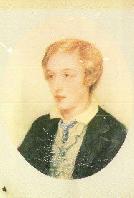

 |
|
|
Gerard Manley Hopkins, born in London in a large Church of England family, horrified this family when he became first a Roman Catholic and then a Jesuit Priest. It seems that his Church Superiors never quite knew what to do with him. He had a deep sympathy for the poor but was exhausted by working with them. By l873 his health was causing sufficient concern that he was forbidden to fast during Lent. Teaching had been deemed a suitable assignment for him, and he was sent to London and given a fairly undemanding teaching assignment. By the end of the term, he was writing that "...my heart has never been so burdened and cast down as this year...." He was sent to Wales, enthusiastically set about learning Welsh but decided he would have to give up the pursuit because he did not feel called on to convert the Welsh. At the same time, he failed at an attempt to teach himself music. Having great guilt at his pursuit of poetry writing, at one point he destroyed all that he had written. A long poem, "The Wreck of the Deutchland," was rejected by the Jesuit journal. The inspiration for this poem was a sad incident in December 1875 when five Franciscan nuns, exiled from their German Empire convent, lost their lives in a shipwreck near the mouth of the Thames. The ship fought valiantly for hours and hours while several would-be rescuers had to turn back for their own safety. While some passengers committed suicide, the nuns prayed and ultimately drowned. For some years, Hopkins felt no poetic inspiration, overburdened by duties of bursar, assisting a parish priest and filling in teaching classes for a master who was ill. Eventually there was another shipwreck and he penned "The Loss of the Eurydice." Hopkins moved to Dublin in February l884. One of his duties at the university was marking papers. This task nearly drove him to destraction, because of his obsession with grading fairly. His job of lecturer drained him physically. The buildings he found himself in were unsanitary and badly needing repair. These conditions likely led to his contracting of typhoid, from which on 8 June l889 he died. Hopkins was a very harsh judge of himself. Consider his poem: THE CANDLE INDOORS. The year is l879, somewhere in the British countryside, a dark and lonely country road at night. Shuffling along this country road, completely enclosed by the darkness of the night, Hopkins plods on, a frail, slight priest who feels himself as lonely as the landscape. Likely he is responding to an emergency call, giving communion to the dying. He has walked this lonely road many times before. As he trudges the path alone, he is all too conscious of the fading fire of his physical and spiritual energies. And then--out of the blackness of the night--he spies the house. The highlight of his walk is always the house with the lighted candle in the window! He approaches the house like a beacon. Everytime he passes the house, he finds himself more and more obsessed with wondering who livedsin that house with the candle in the window. What sort of people are they? Do they believe as he does? How he yearns to see "a little Jessy or Jack there, God to aggrandise, God to glorify..." Then the charmed spell of good feeling bursts and the priest begins viciously berating himself: Who is he to judge others or to dictate standards of conduct in the house that he had passed? Surely he needs to bring the candle indoors, to place the candle in his own heart! But his heart feels closed off, as though in a vault. He can not feel what he wantsto feel for his parishioners. Perhaps--he does not love himself enough. For he then assaults himself even more viciously: You are the master of your heart, do your own desire--are you beam-blind, yet would look for faults in a neighbor! THE CANDLE INDOORS Some candle clear burns somewhere I come by. I muse at how its being puts blissful back With yellowy moisture might night's blear-all black, Or to-fro tender trambeams truckle at the eye. By that window what task what fingers ply, I plod wondering, a-wanting, just for lack Of answer the eagerer a-wanting Jessy or Jack There, God to aggrandise, God to glorify-- Come you indoors, come home; your fading fire Mend first and vital candle in close heart's vault. You there are master, do your own desire; What hinders? Are you beam-blind, yet to a fault In a neighbour deft-handed? are you that liar And, cast by conscience out, spendsavour salt? Anyone who has read Hopkins' poetry, essays or letters will conclude that he suffered from serious anxiety and depression. Bibliography: Norman MacKenzie, Reader's Guide to Gerard Manley Hopkins Catherine Phillips, ed. Gerard Manley Hopkins: A Critical Edition of the Major Works In Catholic School they might teach you all these pious poems Gerard Manley Hopkins wrote, like God's Graudeur "The world is charged with the grandeur of God..." or The Windhover or Pied Beauty. But the true Hopkins can be ferroted out in poems like I WAKE AND FEEL THE FELL OF DARK, NOT DAY I wake and feel the fell of dark, not day. What hours, O what black hours we have spent This night! what sights you, heart, saw; ways you went! And more must, in yet longer light's delay. With witness I speak this. But where I say Hours I mean years, mean life. And my lament Is cries countless, cries like dead letters sent To dearest him that lives alas! away. I am gall, I am heartburn. God's most deep decree Bitter would have me taste: my taste was me; Bones built in me, flesh filled, blood brimmed the curse. Selfyeast of spirit a dull dough sours. I see The lost are like this, and their scourge to be As I am mine, their sweating selves but worse. Hopkins, however, was lucky enough to have one lifelong and lifeline friend and soulmate. Any person can count himself lucky who ever has such a friendship. Robert Bridges, a fellow poet who also worked for awhile as a physician in the real-world, was born the same year as Hopkins, l844, yet lived 41 years longer, until l930. It makes a person ponder when one views the lives of two contemporaries, one never surviving past Victorian times and the other, for better or worse, living on almost into our contemporary craziness. In a short poem that Hopkins wrote to his friend Bridges, he expresses the desire for that one thing which we all need if our days are to count for two beans: THE RAPTURE OF AN INSPIRATION. TO R. B. The fine delight that fathers thought, the strong Spur, live and lancing like the blowpipe flame, Breathes once and, quenched faster than it came, Leaves yet the mind a mother of immortal song. Nine months she then, nay years, nine years she long Within her wears, bears, cares and combs the same: The widow of an insight lost she lives, with aim Now knows and hand at work now never wrong. Sweet fire the sire of muse, my soul needs this, I want the one rapture of an inspiration. O then if in my lagging lines you miss The roll, the rise, the carol, the creation, My winter world, that scarcely breathes that bliss Now, yields you, with some sighs, our explanation. Everything is gratuitous, this garden, this city and myself. When you suddenly realize it, it makes you feel sick and everything begins to drift...that's nausea. (J.P. Sartre) |